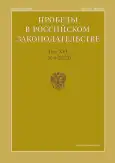The Influence of the Environment on the Formation of Deviant Behavior of Minors: Criminological Aspects (on the Example of Family and School)
- Authors: Serebrennikova A.V.1, Markova G.A.1
-
Affiliations:
- Lomonosov Moscow State University
- Issue: Vol 16, No 6 (2023)
- Pages: 161-166
- Section: Criminal Law Sciences
- URL: https://journal-vniispk.ru/2072-3164/article/view/232149
- EDN: https://elibrary.ru/SXHJPZ
- ID: 232149
Cite item
Abstract
The modern world is full of transformational processes, situations of uncertainty, which affects social interaction. An important aspect of modern life is the transition to a digital environment. Many aspects of public life have not yet found their legal regulation, which contributes to the expansion of illegal actions both in the virtual and real environment. In this regard, one can observe the contradiction between the norms of law and real life. On the one hand, the processes taking place in society are aimed at its development, and on the other hand, the legislation does not keep up with the constantly changing processes, which in turn leads to the expansion of criminal activity. A person develops in the environment, in accordance with the norms and rules that are accepted in society. The concept of "environment" is a very multifaceted term and is considered in different contexts of scientific knowledge. In our work, we will try to identify negative aspects that require reflection and “procreation, (rebirth) <…> based on the birth of new meanings…” (Kiyashchenko, Golofast 2022) and the creation of an environment that contributes to the creation and development of morality and value-oriented. To address this issue, we considered the environment as a factor in which a person is brought up and identified aspects that influence the formation of deviant behavior.
Keywords
Full Text
##article.viewOnOriginalSite##About the authors
Anna V. Serebrennikova
Lomonosov Moscow State University
Email: serebranna@hotmail.com
ORCID iD: 0000-0002-1064-4171
SPIN-code: 7691-8186
Scopus Author ID: 56613319000
ResearcherId: 7898-2022
Dr.Sci.(Law), Associate Professor, Professor of the Department of Criminal Law and Criminology of the Faculty of Law
Russian Federation, MoscowGalina A. Markova
Lomonosov Moscow State University
Author for correspondence.
Email: g_markova@law.msu.ru
Markova Galina Anatolyevna, Specialist in educational and methodological work of the Department of Magistracy of the Faculty of Law
Russian Federation, MoscowReferences
- A. G. Asmolov, E.D. Shekhter, A.M. Chernorizov Anthropological turn: ascent to complexity// Man as an open integrity//monograph.2022 p.33-52.
- A. D. Aseeva The role of family education in the prevention of addictive behavior of young people // Social-psychological and spiritual-moral aspects of family and family education in the modern world. 2013 pp. 320-322.
- A.Sh. Arzikulov, M.A. Umarova Peculiarities of the family situation of schoolchildren with maladaptation//Socio-psychological and spiritual-moral aspects of the family and family education in the modern world.2013 p.309-311
- Artemiev, N. S. Zabelich A. A. Characteristics of professional crime and the personality of a professional criminal// Topical issues of combating crimes. 2017. No. 1. P. 32-37.
- Blokhin V. A. Analysis of juvenile delinquency in Russia// Sat. articles of the II International scientific-practical conference "Law, state, society: topical issues, achievements and innovations". Penza, 2022.
- V.P. Kashchenko Pedagogical correction: correction of character flaws in children and adolescents. 1994 teacher's book 2nd edition M .: Education 223 p.
- Vakulenko N.A., Achkasova M.G. Actual statistical and criminological parameters of modern family crime // Yurist-Pravoved.2022 No. 2 (101) p. 90-95.
- Ziyadova D.Z. Crime among students of general education schools and the problems of its prevention: a regional aspect. Makhachkala, 2004.
- Kolesnikov R. V. Current state of juvenile delinquency// Penitentiary science. 2022. Issue. 16. No. 1 (57). pp. 47-56.
- L.P. Kiyashchenko, A.V. Holofast Man as an open integrity//monograph.2022 p. 7-12.
- N.S. Alpatova The role of the family in preventing deviant behavior of children and adolescents//Social-psychological and spiritual-moral aspects of the family and family education in the modern world.2013 p. 307-309.
- Plesha, L. Yu. To the question of juvenile delinquency// Young scientist. 2021. No. 6 (348). pp. 242-248.
- Portal of legal statistics of the Prosecutor General's Office of the Russian Federation http://crimestat.ru/analytics.
- Since the beginning of the year, there have been almost a hundred cases of false mining of schools in the regions // Vedomosti. April 14, 2023 https://www.vedomosti.ru/society/articles/2023/04/14/970866-s-nachala-goda-v-regionah-bilo-pochti-sto-sluchaev-lozhnogo-minirovaniya-shkol
- Takmakova M. V. The relationship between deviant behavior of adolescents and learning conditions in a modern school: diss. … cand. psychol. Sciences: 19.00.13. M., 2011. 293 p.
- Khanova Z.R. The role of educational institutions in the formation of deviant behavior of minors // Bulletin of the Altai Academy of Economics and Law. 2021. No. 3 (part 2). pp. 265-269.
Supplementary files








